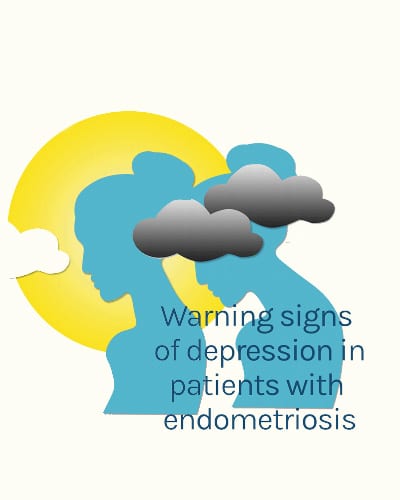Warning Signs of Anxiety and Depression in Patients With Endometriosis

endometriosis diagnosis?
Anxiety and depression are common medical conditions that endometriosis patients are prone to. Endometriosis symptoms such as chronic pelvic pain and dysmenorrhea often have a negative impact on a person’s overall quality of life and mental health. Anxiety and depression may affect psychological and social functioning in individuals with the disease and lead to disruption in various aspects of their lives.
What is the emotional impact of an endometriosis diagnosis?
Doctors often fail to diagnose endometriosis or they misdiagnose it. often goes undiagnosed and is also frequently misdiagnosed. The delay and uncertainty in diagnosis and the severe pain associated with the disease can lead to helplessness, loss of trust in providers, and increase susceptibility to anxiety and depression.
Infertility and concerns of infertility can also lead to worry, feelings of inadequacy, anxiety, and depression. Those with infertility may also feel isolated, worthless, reluctant to discuss experiences with others, and have suicidal thoughts.
What are some of the warning signs of anxiety and depression in endometriosis patients?
The common signs of anxiety and depression in endometriosis patients include:
- feelings of loneliness, helplessness, and hopelessness
- significant appetite changes that result in weight changes of more than 5% of body weight in a month
- loss of interest in daily activities, hobbies, or sex
- insomnia or oversleeping
- low tolerance levels, high irritability, and anger
- fatigue and exhaustion even during small tasks
- feelings of self-loathing and guilt
- reckless behavior such as dangerous sports, rash driving, and substance abuse
- trouble in concentration, memory, and decision-making
- increased incidents of pain
- talking about or contemplating self-harm or suicide
How do doctors treat anxiety and depression?
There are several ways to treat anxiety and depression associated with endometriosis and it is important for patients to find which approach works best for them. Various forms of psychotherapy are available for patients to overcome the disruption that endometriosis creates in their lives. In order to optimize the effect of psychotherapy, it is recommended that patients find a psychotherapist with which they feel they can form a trusting alliance. In more severe cases of anxiety and depression, antidepressants, drugs that alter serotonin levels in the brain, can be used in conjunction with psychotherapy. However, these drugs may aggravate gastrointestinal symptoms of endometriosis.
Relief from physical symptoms, such as chronic pelvic pain, is very effective for alleviating mental health concerns such as anxiety and depression. The best treatment for endometriosis is laparoscopic excision surgery, with the goal of removing all lesions and associated fibrosis. Often, surgical documentation and tissue-based diagnosis are invaluable in validating endometriosis patients’ experiences of the disease.
It is essential for endometriosis patients to acknowledge feelings as valid and practice self-compassion, self-empathy, and acceptance, which can help manage mental health. Alternative and complementary therapies such as mindfulness and yoga can help calm the mind and relieve endometriosis-associated pain.
How can self-care help?
Endometriosis is a chronic disease requiring a life-long personalized management plan, which means that self-care is important to prioritize. Research has shown that self-care and lifestyle interventions can encourage patients to actively participate in and understand their treatment, improve their quality of life and mental health, decrease stress and anxiety, control emotions, and help them feel more secure.
Get a Second Opinion
Our endometriosis specialists are dedicated to providing patients with expert care. Whether you have been diagnosed or are looking to find a doctor, they are ready to help.Our office is located on 872 Fifth Avenue New York, NY 10065.
You may call us at (646) 960-3080 or have your case reviewed by clicking here.